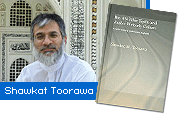16. Shawkat M. Toorawa, Near Eastern Studies
 Ibn Abi Tahir Tayfur and Arabic Writerly Culture: A Ninth-Century Bookman in Baghdad (Routledge Curzon, 2005). Ibn Abi Tahir Tayfur (d. 280/893) was an ancient poet and prose writer, schoolmaster and copyist, independent scholar, member of important literary circles, and significant anthologist and chronicler. Toorawa uses this central but understudied figure as a focal point in his reevaluation of the literary history and landscape of third/ninth-century Baghdad. He demonstrates and emphasizes the significance of the transition from a predominantly oral-aural culture to an increasingly literate and writerly one. This transformation had a profound influence on the production of learned and literary culture; how learning was transmitted; types of literary production; the nature of scholarly and professional occupations and alliances; and the range of meanings of key concepts, such as plagiarism. The book appeals to anyone interested in Arabic literary culture and history and in books, writing, authorship, and patronage.
Ibn Abi Tahir Tayfur and Arabic Writerly Culture: A Ninth-Century Bookman in Baghdad (Routledge Curzon, 2005). Ibn Abi Tahir Tayfur (d. 280/893) was an ancient poet and prose writer, schoolmaster and copyist, independent scholar, member of important literary circles, and significant anthologist and chronicler. Toorawa uses this central but understudied figure as a focal point in his reevaluation of the literary history and landscape of third/ninth-century Baghdad. He demonstrates and emphasizes the significance of the transition from a predominantly oral-aural culture to an increasingly literate and writerly one. This transformation had a profound influence on the production of learned and literary culture; how learning was transmitted; types of literary production; the nature of scholarly and professional occupations and alliances; and the range of meanings of key concepts, such as plagiarism. The book appeals to anyone interested in Arabic literary culture and history and in books, writing, authorship, and patronage.
